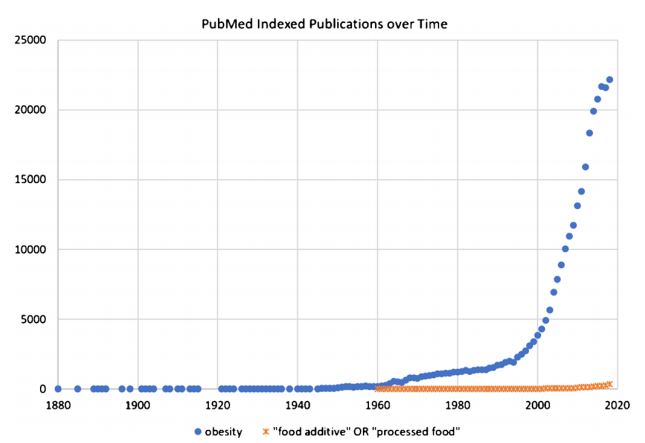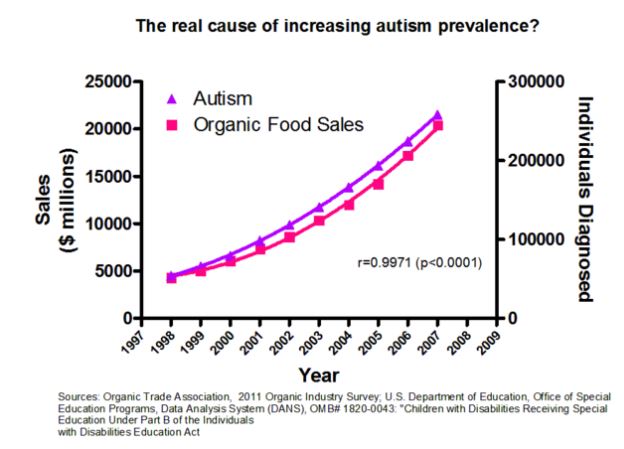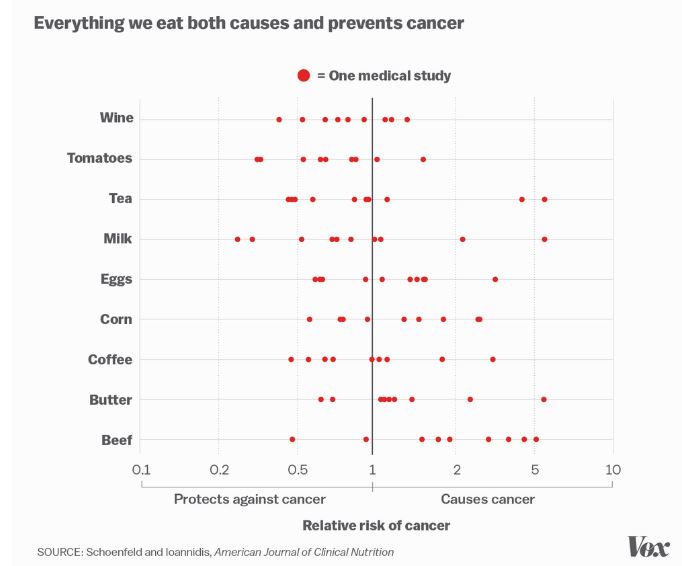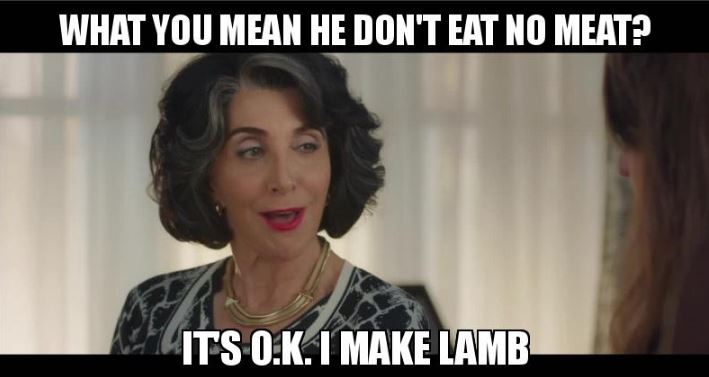If you are not familiar with ultra-processed food, that is a new-ish designation, an arbitrary metric of numerous things to separate it from regular processed food. All bread made in the last 10,000 years is "processed" food, for example, and 'all food is processed' reality hobbled efforts by integrative medicine/food is medicine proponents to claim our modern lifestyle is killing us, when the science community instead knows it's simply obesity that is the risk factor.
What is this "ultra-processed" food? Good luck getting a science answer. Because it's made up, it's definition has changed over time, to be varying levels of fat, sugar, salt, fiber, and even its "process", including whether or not it is advertised. It all depends on who is doing the scaremongering. In the past, if you canned your own fresh vegetables, it was processed and in the same category as Wonder bread you bought in a store - which is why in New Jersey it is illegal to sell bread or jelly you make in your house. Any processed food has the same rules before it can be sold to the public. By putting your fruit in a Ball jar and sealing it in your kitchen you are not obeying the fresh fetish.
Everyone knew that was stupid so now there are efforts to create strata that are just as arbitrary, but at least there are a lot more of them to be confused about. So instead of processed and unprocessed the public is now supposed to understand unprocessed, minimally processed, processed culinary ingredients, processed foods, and ultra-processed foods. And ultra-processed can contain foods whose advertising you happen not to like.
Baffling, right?
I can save you some time. The "ultra-processed" food gimmick is the same mindset that sold the public low-fat diets, trans fats, and the açaí berry gimmick. The people promoting this latest thing basically want you to eat less food that is sold by companies producing the most successful products. Which is not a legitimate health guideline.

Articles about ultra-processed food have not kept pace with articles about obesity. The authors seem to believe that is a weakness of the academic literature rather than a better understanding of how metabolism works than folk/complementary'alternative/integrative medicine people have. It could also be everyone is scrambling to blame obesity on their pet cause using statistics and there are more people blaming something else.
Candy is a "processed" food, as is ice cream, even organic, peptide-fortified, holistic, free-range, dietitian-approved, shade-tree grown, low-fat Ben&Jerry's Hank-a-Hank-o-Burnin'-Fudge ice cream. That's right, peptide-fortified.(1)
In America's increasingly shrill culture war, calling food processed was not working very well, so in true Spinal Tap fashion 'food is medicine' proponents began to 'turn the amp to 11' and use this ultra-processed term. Regardless of its arbitrary category, candy and ice cream are a treat, enjoy those as a treat, don't consume them every day or you will get fat and somewhere a paper will get written claiming ice cream causes early death.
You'll also get fat if you work in an office and binge on 5,000 DASH diet calories a day. I guarantee it.
Food is not magic
Populist journalists really hate when I note that this century has been the first time in history even poor people can afford to be fat and we're all better off for that. But it's true. It means that we only need to solve a cultural maturity problem rather than let developing and rich nations alike be crippled by lack of basic necessities. History shows that when basic needs are affordable - like food and energy - culture follows. Child mortality improves, all health flourishes, crime goes down, science and art go up.
'Food is magic' alternative medicine/integrative medicine/wellness proponents often claim just the opposite - they believe that access to cheap food is a bad thing. Some actually believe they have found the Holy Grail of Obesity, and it isn't calories at all, it is any non-vegetable in the Trader Joe's freezer section. No. It's always the calories. There is no magic food that causes or prevents obesity, in 100 percent of studies people who consume more calories than they burn gain weight, regardless of how many legumes it involves.
All correlation studies, like this one on obesity and ultra-processed food, are only "exploratory" - that means they have no idea if they are really related, they are just creating a statistical correlation that might be interesting and someone else might want to find out if they are really linked.
Yet that is only buried down in the later parts of papers, and journalists write these correlation papers up as if they are causal. Media attention is why correlation studies are big business now. We have everyone from International Agency for Research on Cancer (IARC) to Ramazinni Institute to the National Institute of Environmental Health Sciences (NIEHS) to Harvard School of Public Health jockeying for media attention so they can get more funding. And statistical links are a lot less work than science. In simple form, you can just pick a product and a disease that can give you a "p-value" that editors in journals think is some sort of threshold for legitimacy (.05) and write the paper. You then send it to journals until someone accepts.
Next is to get a press release written and when Science Daily or PhysOrg runs it, a journalist will see it and pitch it in an editorial meeting. Media bosses know that writing an article about the latest Miracle Vegetable or Scary Chemical will get readers so they encourage their employees to grab that low hanging fruit. And nutritionists and epidemiologists know sugar is low-hanging fruit as well. It's been blamed for obesity, trumping calories, for over 100 years.

Comedians poke fun at each other for grabbing low-hanging fruit, epidemiologists will be left behind in their careers if they don't. Screen cap: Comedians In Cars Getting Coffee, now on Netflix.
In meetings with NIH I have asked epidemiology groups if it's possible for government to force grantees to watermark each page of funded epidemiology studies with EXPLORATORY so that journalists will stop claiming X causes Y, and though government sees the problem, their scholars go to parties with friends and hear food fad nonsense like we all do, they don't seem to be able to fix a problem they created by throwing money at survey papers. Which is all you need to know about government.
That means it is up to us to be the critical thinkers. People will write papers that use suspect methodology, sometimes they even mean well. It is not less wrong if their motivations are pure.
When papers have no plausible biological hypothesis for a link that is statistical, it should be regarded by journalists an op-ed with extra references, not a science fact of the week.
Ultra-processed food is not killing you, a Mediterranean diet is not saving you, but if you look at surveys of old people you can claim you find evidence for both.
If you want to promote a lifestyle, you can find centenarians that match - except this one thing
There are a lot of centenarians out there now, 80,000 just in the U.S., and these were all people born before the ballpoint pen was invented so you can imagine that with improvements in medical care, and far lower levels of smoking than decades ago, there will be millions of people over age 100 a generation from now.
This new correlation was created using pockets of centenarians in California, Costa Rica, Sardinia, Greece, and Japan. There is already a weakness in that. As an example, in the 19th century people with "consumption" - tuberculosis - were advised to go to Colorado because of the dry climate. A modern epidemiologist with an agenda would look at that cluster of TB deaths and correlate it so that it looked like moving to Colorado caused death.
That sounds ridiculous, and it is ridiculous, but it happens in food and chemical studies all of the time today. Hardly a paper comes out of our government's in-house scaremongering group, the National Institute of Environmental Health Sciences, that doesn't engage in this same sleight of hand.
By using clusters you can fall victim to lots of confounders, the same way you are fooling yourself if you take an ancestry test and it tells you you're "from" a country, when all it really means is that a bunch of people who moved to that country and also paid to take that test share things in common with you. So it goes with studies using surveys.
People may not live longer if they don't eat Almond Joy's, they may have moved to a place where other people live longer for other reasons. As noted above, statistical studies have attempted to blame sugar for obesity in a magical capacity for over 100 years - before many centenarians were even born.
The link between ultra-processed foods and longevity doesn't survive an obvious test.
There is no valid link between BMI and "ultra-processed" foods
America leads the world in adult science literacy, science output, Nobel prizes, GMOs, prescription drug use, and obesity. If you try, you can therefore look at the curves of any of those and correlate them to each other. These spurious correlations can be used to inform or for humor - when organic industry trade groups tried to claim that the rise in autism was due to conventional pesticides but not the more toxic organic certified pesticides their clients use, the science community responded with a spurious correlation of its own:

This study looked at what centenarians surveyed claim they eat (already a confounder - on surveys Donald Trump was going to lose by 80 electoral votes in 2016) and speculates about what they have in common, and they arrive at lack of ultra-processed food. Yes, they credited longevity to a nocebo - the opposite of a placebo, like if removing a pill that looks like medicine makes you feel better.
Using such a method is suspect. A look at centenarians objectively finds histories of smoking, and alcohol, and meat consumption, along with people who don't do any of those. The one characteristic you struggle to find in centenarians is ... obesity. You don't find lifelong obese people dying at 102. The authors ignore all that and posit that a peasant diet - and never having enough food of any kind - is great for health, but then they make a real reach to claim that "ultra-processed" food is the dietary culprit, not a sensible diet overall, and they use five areas where older people are over-represented, such as Loma Linda, California.
They believe it was not the sensible diet that helped, it was less "ultra-processed" food, even though most people in developed countries have eaten such food their whole lives. Even if they are 100.
Become a Seventh Day Adventist and you won't be obese
The problem with relying on statistical correlation is that it can do a lot of things. Loma Linda has a lot of centenarians, it has a lot of vegetarians, and it also has a lot of Seventh Day Adventists.
If you are trying to correlate a reduction in "ultra-processed" food to longevity, you can do it, because the numbers are there. But if you want to correlate being a Seventh Day Adventist to longevity, you can also do it. Those numbers are also there.
Using such simple correlation, you can "suggest" we live longer if we don't celebrate birthdays or give blood.
The reason it is so easy for suspect correlation to occur is because food frequency questionnaires don't cover 'not giving blood' or refusing to celebrate birthdays, and this review is based entirely on taking food diaries and correlating what people recall eating with their known disease outcomes. The former is a guess and subjected to recall bias but the latter is real.
The problem with this methodology is it can't be trusted. It is why every food can cause or cure cancer by now. Just go to WebMD and you will be terrified at how much cancer is waiting to get you.

No one can ever be wrong using statistics. Pick a common food and studies can show it helps and harms you.

Population level analyses are not helpful for making individual clinical recommendations
Say you take a community of crab fishermen in Alaska, and look at their diets. You create rows of foods and find a statistically significant number of them consume this food, let's say baked beans. You then note the alarming injury and death rate of these fishermen compared to people who live in the Mediterranean and work in an office job and who have much lower early mortality.
Would you conclude that baked beans cause people to die early? No, Alaska crab fishing is more dangerous than an office job on the Dalmatian coast.
Concluding anything else is misunderstanding what things mean.

It's hard to choose one best thing in a terrific movie like "My Big Fat Greek Wedding", but Andrea Martin has to be in the running.
Yet ther press release goes on to confuse the issue by invoking scary-sounding things like emulsifiers and saying they "alter microbiome compositions" (What doesn't? The coffee I drank while writing this sentence did that) changed fasting blood glucose (ditto) but then you wonder where they are going because they cite woo papers claiming that these foods are magic, they cause hyperphagia, weight gain, and hepatic steatosis.
They even create a new form of that quasi-racist dig at Chinese food - 'you'll be hungry again in an hour' - by saying you won't feel full as soon if you eat delicious food versus crusty bread. They then claim people on the diet they're promoting have less obesity and therefore get fewer diseases related to obesity.
Those two things are not causal. There will be five times as many people living in the U.S. over age 100 30 years from now, whether they are ultra-processed food or not.
Sure enough the a co-author turns out to be a 'food is medicine' aficionado.
"Rather than solely treating the symptoms of obesity and related diseases with medication, we need to include efforts to use food as medicine," said Dr. Frame in their press release. "Chronic disease in later years is not predestined, but heavily influenced by lifestyle and diet. Decreasing obesity and chronic disease in the U.S. will require limiting processed foods and increasing intake of whole vegetables, legumes, nuts, fruits, and water. Health care providers must also emphasize lifestyle medicine, moving beyond 'a pill for an ill.' "
That's an incredibly disrespectful thing for a nutritionist who promotes alternatives to medicine to write about a physician, and a physician is her co-author so this was not only a premeditated slur directed at the medical community, it was signed off on by someone with an M.D. who feels the same way.
The fact remains that nanny government, labels, rules, and taxes are not how you change behavior. In New York City, government treats smokers like a cash cow, and when they created the highest taxes in the land, it did not reduce smoking, it caused a huge black market. A man of color died because selling "loosies" became popular and the police were ordered to crack down on sales of a $1 product because it avoided taxes.
Education about the harms of smoking did work, and smoking has plummeted in the United States. That is what we should do when it comes to the impending obesity crisis. Not look for particular foods to demonize because scholars are promoting wellness alternatives.
NOTE:
(1)

Yes, I have made that Elvis joke so many times that 11 years ago Professor Mike White made me my own Peptide.




Comments